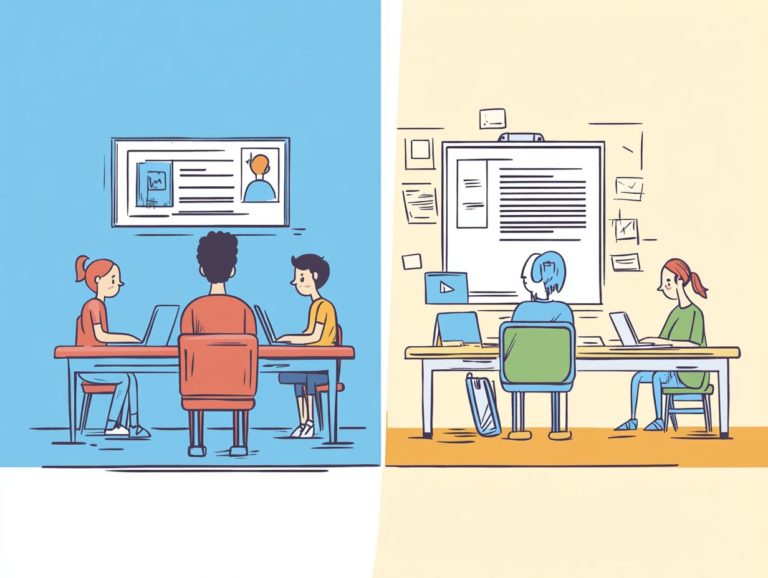The Importance of Career Counseling for Associate Students
Navigating the transition from education to the workforce can feel overwhelming for associate students.
Career counseling is an invaluable resource in this journey, providing the guidance and support you need to recognize your strengths, explore diverse career paths, and set achievable goals. Let s explore the exciting benefits of career counseling!
This article highlights the benefits of career counseling, offers tips on choosing the right counselor, and presents strategies to tackle common challenges you may encounter.
Whether you’re feeling uncertain about your future or ready to take proactive steps, this guide will empower you to make informed decisions about your career.
Contents
- Key Takeaways:
- Understanding the Role of Career Counseling for Associate Students
- The Benefits of Career Counseling for Associate Students
- How to Find and Work with a Career Counselor
- Maximizing the Effectiveness of Career Counseling
- Frequently Asked Questions
- Why is career counseling vital for associate students?
- How does career counseling benefit associate students?
- Who can benefit from career counseling for associate students?
- What services are typically offered in career counseling for associate students?
- How can associate students get access to career counseling services?
- Is career counseling only for students who are undecided about their career path?
Key Takeaways:

- Career counseling helps associate students define their goals and utilize their strengths and interests to explore career options.
- Working with a career counselor can lead to a more successful and fulfilling career path for associate students.
- To maximize the effectiveness of career counseling, students should set goals, take action, and utilize resources and support systems to overcome challenges.
Understanding the Role of Career Counseling for Associate Students
Career counseling is pivotal in shaping your professional journey as an associate student, offering a structured method to explore your career options and aspirations.
This process is crucial for helping you navigate the complexities of the job market, pinpoint your strengths and weaknesses, and cultivate the decision-making skills essential for seamless career transitions.
By receiving tailored support and resources, you are given the power to take charge of your career development, ultimately leading to greater satisfaction and success in your professional life.
Defining Career Counseling and Its Purpose
Career counseling is a professional journey designed to help you make informed career decisions grounded in your strengths, weaknesses, and interests.
This guidance helps you navigate the often overwhelming landscape of potential career paths and encourages self-discovery, prompting you to delve into your personal values and aspirations.
Through various methods such as assessments, interviews, and workshops, counselors help you develop critical decision-making skills.
These tools empower you to align your career choices with your unique competencies and life goals, enhancing both your personal fulfillment and professional success.
Ultimately, career counseling is an invaluable resource in your journey to a fulfilling career.
The Benefits of Career Counseling for Associate Students
The advantages of career counseling for associate students are diverse and invaluable. They equip you with essential tools and resources that foster personal growth while adeptly guiding you through career transitions.
Identifying and Utilizing Strengths and Interests
Identifying and harnessing your strengths and interests is a vital step in the career counseling process. This allows you to align your career aspirations with your personal attributes.
This reflection deepens your self-understanding and unveils a myriad of opportunities that may have once appeared daunting or out of reach.
By engaging in career assessments and self-exploration activities, you can uncover valuable insights into your unique capabilities, helping you pinpoint which career paths resonate with your intrinsic motivations.
As you make sense of these insights, you can establish realistic and fulfilling career goals that align with your passions and talents. This ultimately guides you toward greater satisfaction and success in your future endeavors.
Don t wait! Take the first step in your career journey today by reaching out to a counselor.
Exploring Career Options and Opportunities

Exploring different career options is crucial for associate students. It helps you make informed decisions that fit the job market.
Utilizing resources like online job boards and career assessment tools provides valuable insights into various fields and industries.
Networking strategies, such as attending career fairs and connecting with professionals on platforms like LinkedIn, can greatly enhance your understanding of potential career paths.
Seeking mentorship from experienced individuals can also provide guidance and clarity for successful transitions.
These career resources are not just helpful; they empower you to navigate your choices with confidence, ensuring you select fulfilling and viable paths in today s competitive landscape.
How to Find and Work with a Career Counselor
Identifying and collaborating with a career counselor can greatly influence your career development.
They offer personalized guidance and resources designed to align with your unique aspirations and challenges, helping you navigate your professional journey with confidence.
Researching and Choosing a Counselor
Researching and selecting the right career counselor is essential for students. It ensures you receive tailored guidance that aligns with your needs.
Consider several key factors, including the counselor’s qualifications and experience. Identifying their areas of specialization helps you find someone who understands your desired career path.
Exploring the services they provide can give you insights into the support that suits your needs.
Don t overlook the resources at your educational institution; many schools have career centers staffed with professionals eager to assist you.
Preparing for Counseling Sessions
Getting ready for counseling sessions can make a big difference in maximizing your time with your career counselor.
Engaging in self-reflection exercises offers deeper insights into your strengths, interests, and areas for growth.
Take a moment to jot down your career aspirations and potential obstacles you foresee on your path.
Formulating specific questions to bring to the session helps guide the conversation and clarify uncertainties.
This proactive approach enhances your session’s productivity and empowers you to take ownership of your career journey, increasing your confidence and clarity.
Maximizing the Effectiveness of Career Counseling
To maximize the effectiveness of your career counseling, focus on setting clear goals and using the resources and support systems available to you.
This strategy propels you toward achieving your career aspirations with clarity and purpose.
Setting Goals and Taking Action

Setting clear and actionable goals is essential to your career counseling journey. It guides you through your development and ensures consistent progress.
By establishing specific objectives, you can create a roadmap that channels your efforts effectively.
This structured approach helps you identify key milestones and necessary actions, breaking down ambitions into manageable tasks.
Career counseling plays a pivotal role; it provides mentorship, clarity on your priorities, and insights into potential challenges.
Counselors help align your strengths with relevant opportunities, creating an empowering environment where you can navigate your unique professional journey with confidence.
Using Resources and Support Systems
Using the resources and support systems at your disposal can significantly enhance your career counseling experience. They equip you with the essential tools to navigate your career path effectively.
Beyond traditional counseling, you can explore a wealth of online platforms that offer courses and certifications specifically tailored to your desired industry. Workshops offer hands-on experiences, allowing you to refine your skills in a supportive environment.
Networking strategies are crucial for building connections. Attending industry-specific events or leveraging social media for professional networking can open doors to invaluable opportunities.
By integrating these diverse resources into your approach, you position yourself favorably in the competitive job market, empowering you to make informed decisions about your future career.
Overcoming Common Challenges in Career Counseling
Overcoming common challenges in career counseling is essential for you as a student. By addressing your doubts and fears, you can create a pathway toward a more productive and fulfilling counseling experience.
Addressing Doubts and Fears
Addressing your doubts and fears is essential in the career counseling process. Overcoming these mental barriers can significantly enhance your belief in your ability to succeed and your confidence.
When you acknowledge your anxieties and seek guidance, you can transform those apprehensions into actionable insights. Engaging with career counselors provides you with tailored strategies that resonate with your unique circumstances, offering both emotional support and practical resources.
Actively explore workshops, motivational seminars, and peer networking opportunities that reinforce a positive mindset. Cultivating a habit of reflection through journaling can encourage you to identify and confront specific fears systematically.
By creating a supportive environment and using available resources, you can gradually build resilience, empowering yourself to navigate your career path with renewed vigor and clarity.
Handling Setbacks and Roadblocks
Handling setbacks and roadblocks effectively is crucial for maintaining momentum in your career development journey. This ensures that you remain resilient in the face of challenges.
Confronting unexpected hurdles like poor grades, job rejections, or uncertainty about future paths can indeed feel overwhelming. However, adopting a proactive mindset toward these obstacles can significantly transform your perspective.
Instead of viewing setbacks as failures, see them as opportunities for growth and learning. Engaging in self-reflection, seeking feedback from mentors, or exploring new avenues for skill development are strategic ways to bounce back. Utilizing career counseling services can offer invaluable support, helping you identify your strengths and explore alternatives.
Ultimately, maintaining a positive outlook is essential, as it not only boosts your confidence during transitions but also opens the door to new possibilities.
Frequently Asked Questions
Why is career counseling vital for associate students?
Career counseling for associate students is important because it helps them make informed decisions about their academic and career goals. It also provides them with the necessary guidance and support to achieve those goals.
How does career counseling benefit associate students?
Career counseling benefits associate students by helping them explore their interests, skills, and values, aligning them with potential career paths. It also assists them in developing essential job search and interview skills.
Who can benefit from career counseling for associate students?
Any associate student, whether they are unsure of their career path or have a specific career goal in mind, can benefit from career counseling. It is especially helpful for students facing challenges in their academic or personal life that may affect their career choices.
What services are typically offered in career counseling for associate students?
Career counseling services for associate students usually include career assessments, individualized career planning, resume and cover letter assistance, job search strategies, mock interviews, and networking opportunities.
How can associate students get access to career counseling services?
Most educational institutions provide career counseling services to their students. Associate students can access these services through academic advisors, career centers, or counseling offices.
If in-person options are not available, online career counseling services are also an excellent choice.
Is career counseling only for students who are undecided about their career path?
No, career counseling is useful for all associate students. Whether you are undecided or have a clear goal, these services can help you confirm your choices.
Career counseling offers valuable insights and helps you develop essential skills for your chosen path.







